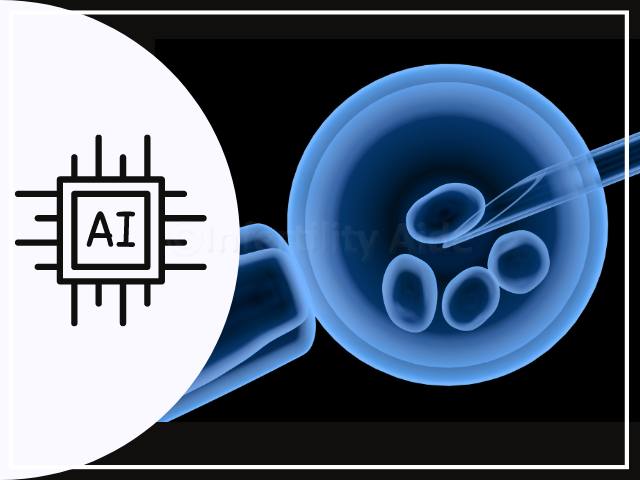Using Artificial Intelligence or AI in IVF is a way to improve the reliability and success rates of ART. So, how does AI help the IVF process?
With AI, doctors and embryologists can learn how likely an embryo is to develop even upto the third week of gestation and can select the embryo with the highest potential for transfer.
However, despite the rapidly progressing technology, there isn’t enough data on the use of AI in IVF to influence its usage in most clinics.
Some of our top IVF doctors in Malaysia have made successful application of this technology in past 3 years.

The use of artificial intelligence in assisted reproductive technology has been able to improve embryologists’ capacity cycle and chances of live birth more than earlier (1). With more development in such early detection tools and more data collection, the usage of AI in IVF might become routine in the coming years.
How can AI help with IVF success?
The success of your IVF depends, in part, on some of the key decisions made during the clinical treatment and the expertise of your embryologist or fertility doctor.
- When to start the stimulation process?
- What shall be the timing of the egg retrieval?
- Which is the best embryo to transfer?
In the traditional approach, the embryologist makes these judgments based on the manual inspection of images in the lab using techniques like microscopic/ time-lapse imaging. However, this leaves a possibility of error due to the use of different equipment and varying image quality.
If accurate decisions are not made at these leverage points, the possibility of IVF success may drop drastically at each step. This also makes the standardization of the process quite challenging.
This is exactly when AI can help to minimize the chances of human error and allow for better clinical decision-making.
At what steps in IVF is AI useful?
Once the AI is trained, it can rapidly compute and draw accurate inferences for better IVF outcomes. Supervised AI approaches are data-driven.
The method uses computer algorithms or image analytics to enhance embryology and the predict the effectiveness of embryo transfer.
At present, work is going on for using:
- AI in embryo selection
- AI in gamete selection and best oocyte and sperm combination
- AI in designing a personalized fertility treatment regimen

AI in embryo selection
With the use of machine learning, data is collected to study the different traits of growing embryos in women who have already had successful pregnancies.
AI can then compare those traits with the sample embryo to indicate its quality and viability that may be difficult to assess by the naked human eye.
After the assessment, an Implantation Potential Score (AI score) is provided as a measure of the viability of a successful pregnancy through IVF.
To summarize, here are the steps used in AI for embryo selection:
Step 1 – Microscopic images of each blastocyst are uploaded in the AI software.
Step 2 – An AI score is generated for each blastocyst, which decides the implantation potential and other factors that could result in a positive pregnancy.
Step 3 – The blastocyst with the highest AI score is chosen to transfer to the uterus of the mother.
AI in gamete selection
One of the best potential uses could be semen analysis, where the motility, morphology, or vitality of the sperm can be better assessed with artificial intelligence.
AI removes the subjectivity of human assessment in the traditional process, and instead objectively ranks gametes based on quality. It will be especially helpful in the selection of sperm for ICSI.
AI in diagnosis & fertility treatment planning
AI can be used for data mining of existing patient records and discovering novel markers to accurately predict chances of pregnancy and live birth.
Interestingly, the use of artificial intelligence applied to text mining led to the discovery of novel genes involved in the pathogenesis, development, progression, and diagnosis of endometriosis, which is one of the leading causes of infertility in females in their reproductive age (2).
What are the benefits of using AI in IVF?
- Though there exist techniques like embryo grading that may help in the analysis of good embryos, AI could really take it to the next level by helping your embryologists choose the ones that have the highest potential to result in a healthy baby.
- AI can help reduce IVF costs by reducing the number of IVF cycles that might be required to achieve clinical pregnancy.
- AI can assess what is the optimal time for embryo transfer, saving time for both the patient and the doctor
- AI allows for more transparency in the IVF cycle by helping in diagnosis and treatment planning
How can AI help my IVF?
AI in assisted reproductive technology could be helpful if you:
• Are undergoing IVF
• Have experienced implantation failures
• Have multiple embryos available for selection
Are there any clinics using AI in IVF?
Currently, IVF clinics using AI for enhanced embryo selection are very limited. Even though some of our leading IVF clinics in Malaysia started using this technology successfully back in 2021 and became South-East Asia’s first to achieve successful pregnancy using artificial intelligence (AI)-enhanced embryo selection technology.
In July 2022, an Israeli start-up ‘Fairtility’ became the first company to receive European Conformity CE Mark to use AI for assessing embryonic vitality.
Flairtility’s CHLOE EQ is an AI design that assesses and automatically selects embryos with high accuracy and also has ~73% fair agreement with the embryologists in a study of 193 cleavage embryos in their first cycle of IVF (3).
Though there are several benefits of using IVF intelligence, most small-sized fertility clinics are yet to avail it due to several challenges like limited availability of data, integration of current practices in the workflow, limited awareness amongst the stakeholders, etc.
The deployment of AI in reproductive sciences is happening at a fast pace(4), although widescale usage may still take a few years. AI can help the IVF process become more affordable and efficient and we hope that the integration of this new technology will improve IVF’s long-standing stagnant success rate and your aspirations of becoming a parent.
To find a suitable clinic that offers this advanced technology of AI in IVF, get in touch using the red contact button here.
References
- Darren J X Chow, Philip Wijesinghe,Kishan Dholakia,and Kylie R Dunning. Does artificial intelligence have a role in the IVF clinic? Reprod Fertil. 2021 Jul; 2(3): C29–C34. doi: 10.1530/RAF-21-0043
- J Bouaziz, R Mashiach, S Cohen, A Kedem, A Baron, M Zajicek, I Feldman, D Seidman, D Soriano, How Artificial Intelligence Can Improve Our Understanding of the Genes Associated with Endometriosis: Natural Language Processing of the PubMed DatabaseBiomed Res Int. 2018 Mar 20;2018:6217812. DOI: 10.1155/2018/6217812
- P. Fauque, J. Frappier, J. Barberet, A. Brualla, N. Bergelson, C. Hickman, Use of CHLOE-EQ to select embryos for transfer at the Cleavage stage: a pilot study using paired sibling embryos with known implantation, Volume 45, SUPPLEMENT 1, e47-e48, October 01, 2022. DOI: https://doi.org/10.1016/j.rbmo.2022.08.082
- Sadeghi M. R. (2022). Will Artificial Intelligence Change the Future of IVF?. Journal of reproduction & infertility, 23(3), 139–140. https://doi.org/10.18502/jri.v23i3.10003
Reviewd by: Dr. Meenakshi